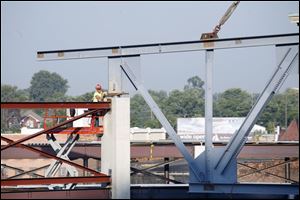
State wants more arena information on financing
8/22/2008
Lucas County's construction of its $100 million arena downtown without a signed agreement from the organization that will own the Toledo Walleye minor league hockey team is a significant risk, a consultant for a state commission says.
The Ohio Cultural Facilities Commission wants more information about the financing of the Lucas County arena project before releasing $7.7 million in state funds.
The report, written in June and presented during a July meeting with the commission, criticizes the county for going ahead with the $100 million project without full documentation of how it will be funded or a signed agreement with the sports franchise.
"The consultant considers the county to be proceeding at significant risk by commencing construction without having confirmed the project sources or executed the leases and management agreements," the report states.
But officials with the project claim they do have the funding all lined up for the project, they just have not yet signed agreements with Toledo Arena Sports Inc., the nonprofit organization that will own the Toledo Walleye, the minor-league hockey team expected to play in the arena.
"We've been negotiating the lease [with the hockey team] for months. We're not going to play until the fall of '09; it's not something that is important to have signed before July of '08," said Tom Chema of Gateway Consulting, the Cleveland firm representing the arena project.
"There are a lot of other, more immediate things," he said.
Construction began early this year. The "multipurpose" arena will host the Walleye and a yet-to-be-announced Arena League Football team as well as concerts and other events, according to county officials.
The county commissioners have said the project will be paid for by its own revenue and the increased hotel-motel tax.
But the report says the county should have done more to document funding for the arena. To release $7.7 million in state funds, the commission wants:
•More documentation of funding sources.
•An executed lease agreement with Toledo Arena Sports.
•A signed agreement with an Arena League Football team.
•Documentation of expected revenue from nearby parking.
While no deadline has been set, the commission meets again in November.
County officials said they've complied with many of the requests. Since the report was issued, the county has borrowed $90 million in "bond anticipation notes," or brief, one-year loans with small interest rates.
But it has yet to sign a lease with Toledo Arena Sports or announce an Arena League Football franchise at the arena.
"We're going to have an AFL team. All the work has been done to accomplish that," Mr. Chema said.
Officials say a signed lease with Toledo Arena Sports isn't crucial because it is a nonprofit organization set up by the county to operate the hockey franchise. It is the same setup the county used for Fifth Third Field.
"At the end of the day, the hockey team is us," Commissioner Pete Gerken said. "We're kind of negotiating with ourselves."
The report says the project's "unique aspects" mitigate against possible risk, but still cautions about financing.
"The consultant considers the business plan to be feasible," the report states. "However, until the county's bonds are issued and all leases and operating agreements are executed the project represents a financial risk to the county which could (in the worst possible scenario) represent the full amount of annual debt service."
According to the report, the revenue will have to be at least $1.1 million a year and the payments for debt can't be more than $4.4 million a year in order for the project to remain solvent.
County Administrator Michael Beazley noted that Fitch Ratings gave the county the highest possible rating, indicating that it believes there is a strong probability that the debt will be repaid.
If the county fails to attract an Arena League Football team, it could lose between $137,000 and $249,000 a year, according to the report.
The arena will have to receive at least $11.6 million for the arena's naming rights in order to meet financial projections, according to the report.
While county officials acknowledge that the downturn in the economy has made it more difficult to find companies willing to sponsor the stadium, they say they are still on track to announce the stadium's name before it opens in the fall of 2009.
The report also implies the county will be using general operating fund dollars to finance the project, but county officials strongly deny they plan to dip into that fund.
The report says the county's finances call for $12 million to be paid from the county's capital improvement fund, but no money has been appropriated.
The county's 2008 "Adopted Budget and Plan" does include the arena on a list of funded projects.
But claiming funding will come from "a variety of sources," the budget report states that the arena project will have "no impact" on the improvement fund.
Mr. Beazley said the money from the capital improvements budget will be repaid with money from the bonds.
County officials concede that, ultimately, the county would be responsible for the arena's debt should the expected revenues not materialize.
But Mr. Gerken said the risk had been minimized with strong financial planning.
"It's the same argument we had with Fifth Third Field," Mr. Gerken said. "We took a risk, and it's paid off in spades. You don't do a hundred million dollar project without risk. You take it, and you minimize it."
Contact Alex M. Parker at:
aparker@theblade.com
or 419-724-6107.